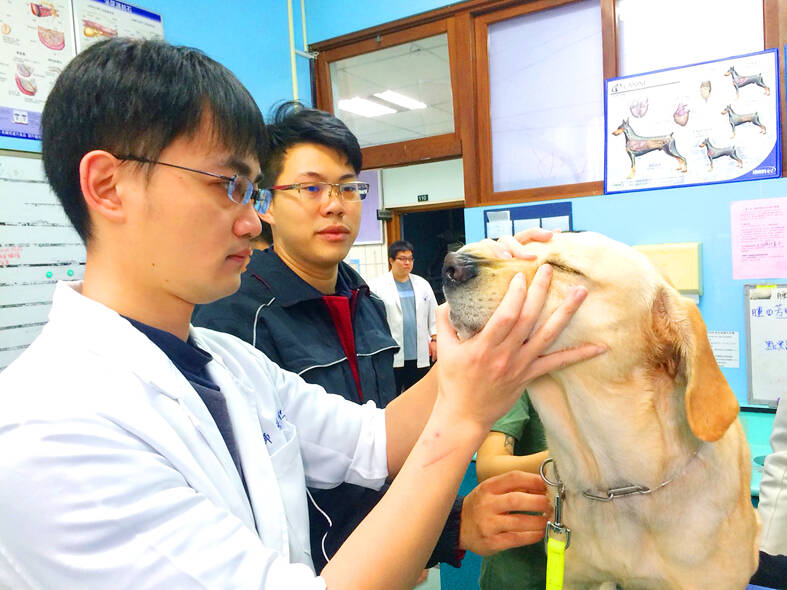The number of pet dogs and cats in Taiwan has officially outnumbered the number of human newborns last year, data from the Ministry of Agriculture’s pet registration information system showed.
As of last year, Taiwan had 94,544 registered pet dogs and 137,652 pet cats, the data showed. By contrast, 135,571 babies were born last year.
Demand for medical care for pet animals has also risen. As of Feb. 29, there were 5,773 veterinarians in Taiwan, 3,993 of whom were for pet animals, statistics from the Animal and Plant Health Inspection Agency showed.

Photo: Tsai Shu-yuan, Taipei Times
In 2022, the nation had 3,077 pediatricians. As of last year, 1,880 doctors joined the specialist physician program for children under three years old, who were in charge of caring for 195,552 children in 1,048 medical institutions.
The percentage of veterinarians that specialize in pet animals are higher in metropolitan areas or cities with tech professionals.
Hsinchu City, where the Hsinchu Science and Industrial Park is located, has the highest percentage of animal medical specialists.
The percentages in the six special municipalities are as follows: 84.3 percent in New Taipei City, 78.4 percent in Kaohsiung, 76.7 percent in Taoyuan, 76.4 percent in Taipei, 76.1 percent in Taichung and 70 percent in Tainan.
The nation has about 1,800 animal hospitals, but the number could potentially increase to 2,000 by the end of this year or next year, Taipei Veterinary Medical Association chairman Yang Hsiao-po (楊孝柏) said.
On average, each veterinarian cares for 575 animals, compared with 2,500 in Japan and 4,000 in the US, he said.
The rising demand for medical care for pet animals has also motivated more animal hospitals to increase investment in medical facilities, he added.
“In the past, veterinarians could open an animal hospital with just a table and a stethoscope. A large percentage of people treated their pets as nothing more than animals. If a dog or a cat vomited, you only needed to prescribe some medications, and if it did not work, pet owners just came back for more visits,” Yang said.
“People now treat dogs and cats as family members, and they could live as long as humans,” he said. “Animals now receive the same medical treatment as humans do. If they throw up, you have to do blood tests and an ultrasound to determine [whether] they have gastroenteritis.”
Not wanting to have children is only one of the reasons why more people choose to become pet owners, Yang said.
“Raising dogs and cats has healing effects, and people would choose to have pets to accompany their elderly parents so that their parents can have a normal and more social life,” he said.

Alain Robert, known as the "French Spider-Man," praised Alex Honnold as exceptionally well-prepared after the US climber completed a free solo ascent of Taipei 101 yesterday. Robert said Honnold's ascent of the 508m-tall skyscraper in just more than one-and-a-half hours without using safety ropes or equipment was a remarkable achievement. "This is my life," he said in an interview conducted in French, adding that he liked the feeling of being "on the edge of danger." The 63-year-old Frenchman climbed Taipei 101 using ropes in December 2004, taking about four hours to reach the top. On a one-to-10 scale of difficulty, Robert said Taipei 101

Nipah virus infection is to be officially listed as a category 5 notifiable infectious disease in Taiwan in March, while clinical treatment guidelines are being formulated, the Centers for Disease Control (CDC) said yesterday. With Nipah infections being reported in other countries and considering its relatively high fatality rate, the centers on Jan. 16 announced that it would be listed as a notifiable infectious disease to bolster the nation’s systematic early warning system and increase public awareness, the CDC said. Bangladesh reported four fatal cases last year in separate districts, with three linked to raw date palm sap consumption, CDC Epidemic Intelligence

US climber Alex Honnold left Taiwan this morning a day after completing a free-solo ascent of Taipei 101, a feat that drew cheers from onlookers and gained widespread international attention. Honnold yesterday scaled the 101-story skyscraper without a rope or safety harness. The climb — the highest urban free-solo ascent ever attempted — took just more than 90 minutes and was streamed live on Netflix. It was covered by major international news outlets including CNN, the New York Times, the Guardian and the Wall Street Journal. As Honnold prepared to leave Taiwan today, he attracted a crowd when he and his wife, Sanni,

Taiwanese and US defense groups are collaborating to introduce deployable, semi-autonomous manufacturing systems for drones and components in a boost to the nation’s supply chain resilience. Taiwan’s G-Tech Optroelectronics Corp subsidiary GTOC and the US’ Aerkomm Inc on Friday announced an agreement with fellow US-based Firestorm Lab to adopt the latter’s xCell, a technology featuring 3D printers fitted in 6.1m container units. The systems enable aerial platforms and parts to be produced in high volumes from dispersed nodes capable of rapid redeployment, to minimize the risk of enemy strikes and to meet field requirements, they said. Firestorm chief technology officer Ian Muceus said